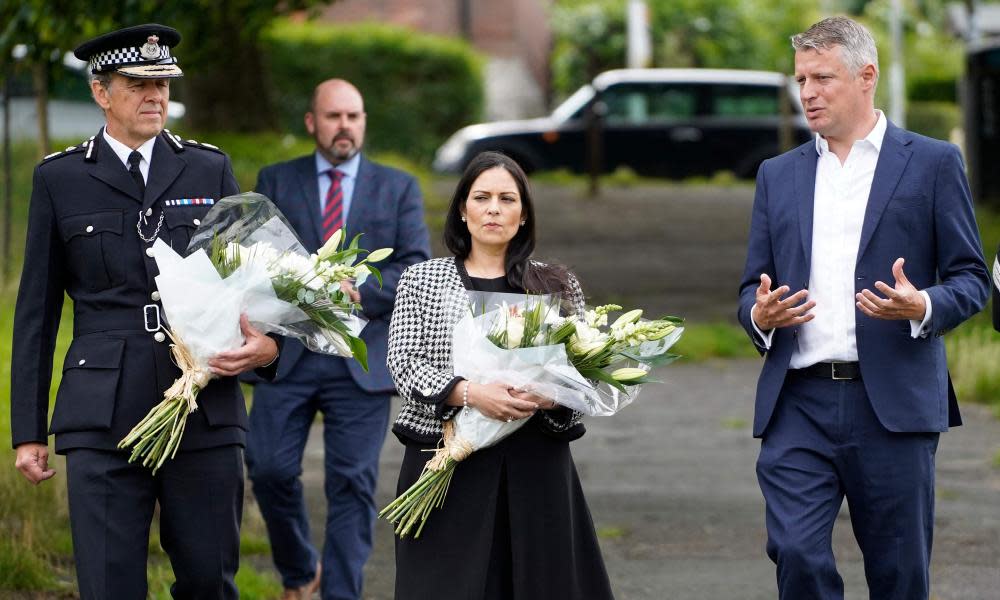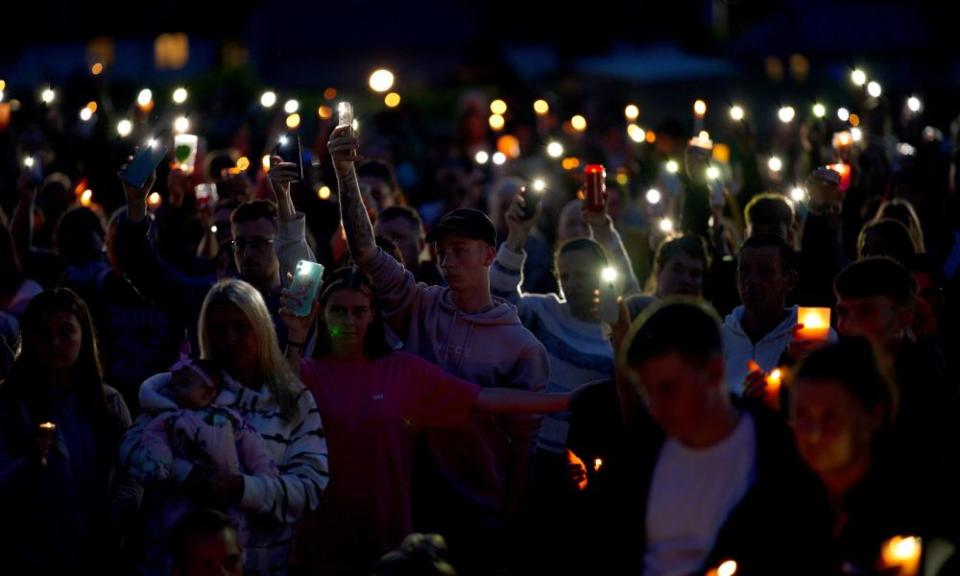‘Broken’ gun licensing scheme risks another Plymouth, warn campaigners

The home secretary, Priti Patel, faces calls to overhaul gun licensing laws as campaigners warn a “broken” system is needlessly putting lives at risk.
Patel agreed last week to meet Plymouth residents about gun controls after Jake Davison, 22, a licensed gun holder, killed his mother and four passersby, including three-year-old Sophie Martyn, in an attack in the city last August.
Luke Pollard, the Labour MP for Plymouth, Sutton and Devonport, said: “The gun control system is broken and needs reform. What we’ve experienced has been so horrific and so awful that we do need to take steps to work out how this can be prevented from happening in the future.”
Britain has some of the strictest gun control laws in the world as a result of restrictions brought in after the killing of 16 people in Hungerford in August 1987 and the murder of 16 children and their teacher at Dunblane primary school in March 1996. Handguns are now banned in Britain for most purposes. There are, however, concerns about the licensing regime overseen by police forces. Both gun control campaigners and shooting groups agree that the system is badly under-resourced.
One expert at the British Association for Shooting and Conservation (BASC) warned the regime was “close to collapse” and it was likely some guns were now being held illegally because of delays in licence renewals after the Plymouth shootings.
Gun control campaigners want major reforms to avoid further tragedies. Gill Marshall-Andrews, of the Gun Control Network, a non-profit organisation formed after the Dunblane tragedy, said: “The problem with gun licensing is that it is grotesquely underfunded and systems are not properly integrated to flag up potential problems.
“The system has clearly failed. We have a very low level of gun homicide in this country, but if there was a better licensing system and the police were more vigorous, then we wouldn’t have had some of these tragedies.”
The network wants an increase in the licence fees to cover the full cost of policing the system; a national gun hotline for those wishing to record concerns about a gun; and mandatory notification to partners and former partners of an individual making an application.
Police forces are responsible for issuing shotgun certificates, which cost £79.50, and firearms certificates, which cost £88 and are mostly for rifles. On 31 March last year, there were 1,379,399 certificated shotguns and 617,171 certificated firearms and sound moderators, which reduce the noise or flash of a weapon, in England and Wales.
Bill Harriman, the BASC’s director of firearms, agreed more resources were urgently required and said the licensing system was “shambolic”. The association is urging chief constables to “get a grip”.

He said: “We are concerned that firearms licensing is close to collapse. There is a lack of trained personnel, a lack of resources and a lack of consistency in how the scheme is administered by different police authorities.
“The delays for renewing a firearms certificate can be two or three months and if the certificate expires those weapons are held illegally.” He said he was very concerned that some weapons were now being held illegally because of recent delays.
A report by Her Majesty’s Inspectorate of Constabulary and Fire & Rescue Services in 2015 entitled Targeting the Risk warned of the danger of tragedies because of “fundamental gaps” in licensing in England and Wales. It recommended a package of reforms including statutory guidance for police forces and independent scrutiny of decisions.
The report’s authors were pessimistic that any of the recommendations would be implemented. They warned: “What is highly likely is that, if change is not effected, there will be another tragedy.” Last August, when Davison went on his rampage, the key recommendation of the report for statutory national guidance of firearms licensing was still not in place.
It emerged after the fatal shootings that Davison’s shotgun and certificate had been seized by police in December 2020 after he allegedly assaulted two youths in a park in the city. The weapon and certificate were returned to him the month before the killings after he reportedly attended an anger management course.
Police also failed to check his social media accounts, which would have revealed his misogynistic and homophobic views and his presence in online forums for “incels” (men describing themselves as “involuntary celibates”). He compared himself in one YouTube video to the cyborg killer played by Arnold Schwarzenegger in the Terminator films.
Related: Plymouth shooting: police must explain return of gunman’s licence, says Starmer
The firearms licensing department at Devon and Cornwall Police, which was responsible for granting the shotgun certificate to Davison, is under investigation by the Independent Office for Police Conduct. Three employees have been served disciplinary notices warning them their conduct is being scrutinised. The inquests into the people killed by Davison were formally opened last August.
New statutory guidance for licensing came into force last November, but campaigners want to see a thorough review of practices and more wide-reaching reforms. People in Plymouth also want a review of rules which permit pump-action shotguns, the type of weapon Davison owned, to be kept in residential areas.
The Home Office said: “Following the tragic incident in Plymouth, the home secretary asked all police forces to urgently review their firearms licensing practices. The returns provided reassurance that the police have in place robust processes for issuing and reviewing firearms and shotgun licences. We have been clear that we will update the statutory guidance for firearms licensing should there be lessons learned from this case. But the UK has some of the toughest firearms laws in the world and while we are not complacent about these high standards, thankfully such incidents are rare.
“Firearms licensing is an operational matter for individual police forces. Some applications for firearm certificates are inevitably being affected by the Covid-19 pandemic, but normal procedures are being maintained as far as possible.”
The National Police Chiefs Council said: “Policing takes the matter of firearm licensing incredibly seriously. Individual forces are responsible for issuing firearms certificates, and will only do so after their application has been assessed by a dedicated team of experts, a robust process of background checks is completed, and the individual meets criteria set out in the Home Office’s national legislation.”

 Yahoo Movies
Yahoo Movies 
